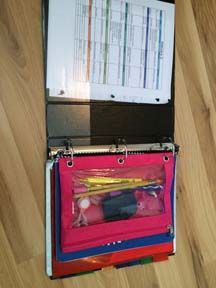I am a huge supporter of planning. I like to color code, I like to schedule, I like things to be predictable. When we started homeschooling, I figured I might as well apply my love of all things organized to that aspect of our lives as well. I've shared the planners I bought the kids to keep them on track each day. But where do they get the information to put in their planners and how do they stay on track when the day doesn't go as planned?
That's where I come in. Last year, I used an excel spreadsheet to lesson plan. It worked fine, it was flexible enough that I could make it look like how I wanted it to look and it kept track of stuff. The problem was it didn't allow life to happen. If something happened that prevented us from getting work done, I had to cut and paste the information forward, which was a pain. I would plan several weeks or months at a time and anytime life happened, like someone got sick or a fun field trip opportunity came up, hours of careful planning went out the window and I'd pretty much have to start over.
This is a screen shot of my spreadsheet. Each day had it's own color and I also included the chore of the day, so they'd always know.
The thing I did like was that I would do the majority of my planning a few times a year and then be basically done. Every Sunday afternoon, I would sit down with my spreadsheet and verify that everything was accounted for, for the whole week. I would go through each subject for each kid and see what they were doing each day, so even if I wasn't teaching it directly (like math, that they do online), I would still know what they had scheduled. My spreadsheet had all of the URLs of online resources and I would go through each one and make sure that everything was printed off. Then, I printed a copy of the spreadsheet.
Last year, they used plain three binders to organize their papers. Mostly, it was because we had them from public school. Even just being used at home, they took kind of a beating and they might have made it a second year, but I'm kind of doubtful.

This year I got them expanding pocket files from Mead which are pretty neat. They have a "turn in folder" in the back of the binder, because I don't want them handing stuff in piecemeal and I want them to practice being responsible for knowing where something is for a few days at a time.
I take all of the print outs and file them by the day they will be starting working on. So if they have a spelling list that they use all week, I'll put it in the Monday folder or tab and then when they complete Monday's work, they move that paper to Tuesday. I put the weekly schedule printout in the front (last year, I put it in the inside pocket of the binder, this year, it goes outside, so they can always see it) pocket and then I put their folders away in their rooms.
This lets us be fairly mobile for school. Anywhere I can get the internet, we can get work done, just by grabbing the binder and going. So if we have a doctor's appointment or something, we don't have to throw away our whole schedule. They both work better at home, but work can be done pretty much anywhere.
The biggest benefit for week at a time planning reared its ugly head last winter. I got sick, like so very very sick. Not only did I not feel like teaching, I could barely get out of bed and I couldn't talk at all. My brain was total mush and the most energy I could muster was dragging myself to the bathroom a few times a day. There was no way I could teach them anything or even pull together materials for them to work independently. Instead of letting it turn into Lord of the Flies around here and throw out the whole week, they already had their assignments, including websites for online, plus all their printed materials, on the day they needed them. They weren't able to get everything done. There were some subjects that did require my input. There were a few technology glitches, that prevented certain things from getting done, but they finished the majority of the assignments for the week and it wasn't a total loss. The week still counted towards our 180 days, so we didn't have to go an extra week into June.
I'm a stickler for schedules and I like sticking to them as much as possible, but sometimes things happen. Planning for the entire week, up front, helps us stay on track when those things happen.
How do you stay on track with your schedule?




No comments:
Post a Comment